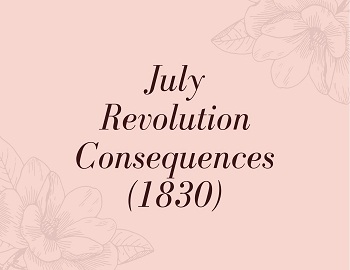July Revolution Consequences:
The July Revolution was an unexpected affair. It had brought about the end of Charles X and had integrated the reign of Louis Phillippe. It resulted mainly in the transfer of administration from one set of politicians to another. The changes introduced into the constitution were of minor importance. The king was deprived of the power to issue ordinances in emergencies and the right of legislation was given to the Chamber. Press restrictions were abolished. Catholicism ceased to be the established religion. But the franchise was not adequately extended.
But the real merit of the revolution lay in the fact that its significance was negative rather than positive. There could be no question that in any struggle between the king and the nation, the latter was bound to prevail. The revolution struck a balance between liberty and order, parliamentarian and authority. The Revolution of 1830 was the complement of the Revolution of 1789. For the future, the principles of secularism, equality and constitutional liberty, rested on a firm foundation.
It was an old saying that when France caught cold all Europe sneezed. The effects of the July revolution were felt in other countries as well. In 1830 Belgium rose in revolt against Holland to which country they had been annexed by the Peace of Vienna. Not only were the two countries separated by history and tradition but the Belgians were industrial while the Dutch were agricultural. Thanks to Britain and France an international conference of 1831 recognized the independence of Belgium. But it was only in 1838 that the Dutch accepted the Treaty of 1831 and recognized Belgian independence. The independence and neutrality of Belgium were guaranteed in 1839 by the great powers.
In Germany especially in Hanover, Saxony, Hesse-Cassel, Bavaria, Baden and Wurttemberg, riots and demonstrations frightened the rulers into granting liberal constitutional. But in Germany liberalism gained a temporary triumph. By 1835 reaction was against triumphant.
In Italy, the liberals raised a tricolour flag in the Papal States while outbreaks in Parma and Modena forced their Habsburg rulers to flee to Vienna. But Metternich was quick to suppress the outbreaks by rushing troops into Italy. Despite their immediate failure, the revolution of 1830 gave birth to the Italian movement for national regeneration.
In November 1830, Poland rose in revolt against Russian rule. By the autumn of 1831, the Russians were able to crush the rebellion.
Although Britain did not experience any revolution in 1830, the demand for liberal reform was growing. In 1832 the first Reform Act was passed which increased the number of voters by giving the urban middle class the right to vote. Thus political power was henceforth shared between the landed and the business classes.









Comments (No)